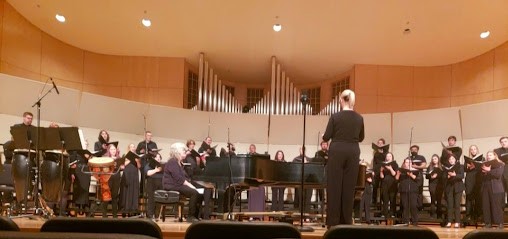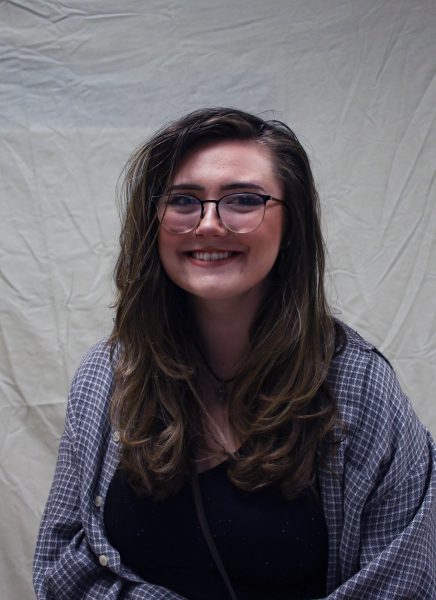Choirs reflect on social justice issues in final concert

Photo courtesy of Annamarie Parker
FINAL PERFORMANCE – Erin Colwitz directs her choirs on Thursday April 21. For many senior performers, this was their final choir performance.
May 1, 2022
The Northern Michigan University choral performed their last concert of the winter semester, A Celebration of Renewal and Rebirth, on Thursday April 21, in Reynolds Recital Hall at 7:30 p.m. The Arts Chorale and University Choir came together to say a farewell to their graduating seniors and enveloped the crowd in a variety of songs, including one that was an in-person world premiere.
“I tried to program music that had a sense of renewal or rebirth,” Choir Director and Associate Professor of Music Erin Colwitz said. “With COVID and such over the past two years, I felt that this concert had more connection to what is happening in our own communities.”
Colwitz tried to select music by composers of color, particularly women of color, and songs that have social justice themes.
Colwitz said that her students in The University Choir really enjoyed “Wanting Memories” by Ysaye Barnwell, a Black female composer, because so many of them have struggled with loss over the past two years, for a variety of reasons. She believes the recent uptick in suicides hit home with a lot of her students, as well.
One of the lines in that piece that stood out to Colwitz was the main line of the chorus: “And I am sitting here wanting memories to teach me to see the beauty of the world through my own eyes.”
Students in The Arts Chorale connected with another beautiful piece, “Festival Te Deum” by Benjamin Britten, as well as “To be a Stranger” by their guest and composer, Eric Banks.
Colwitz describes the latter piece as being commissioned by a Chinese American friend of Banks who wanted the singers and poets to be people of color from the beginning. This piece was created right after George Floyd’s murder and writers such as Frederick Douglass were inspirations for Banks. Dorothy West, a Black female author, also contributed to the composition. Banks used her text for the very first line of the piece, “Identity is not inherent, it is shaped by circumstance and sensitivity,” according to Colwitz.
“The choir and I had many wonderful conversations about the text and what it means,” she said.
A line they talked about in particular was “Choose confrontation wisely, but when it is your time, don’t be afraid to stand up, speak up and speak out against injustice.”
They discussed the themes of social justice and bravery found within this line and “To be a Stranger” as a whole.
“This [line] hit us particularly hard,” Colwitz said. “We realized that we all have work to do.”
Colwitz talked about creating a tradition at NMU, by singing “The Road Home” by Stephen Paulus at the end of each concert.
“I always tell the students that I hope they will always feel that NMU is ‘home,’ and no matter where they go, that they may have a place to call home,” she said.
The difference between The University Choir and The Arts Chorale is that The University Choir is far less rigorous commitment-wise, Colwitz said. They both require auditions, but The Arts Chorale is highly auditioned, has about 24 singers, rehearses more often and with more difficult music. They commonly do about two concerts per semester but also travel a lot.
They have about 6 to 7 weeks to prepare for each concert, she said.
“I’ve been singing in choirs for most of my life,” Andy Vanwelsenaers, senior music major, said.
Vanwelsenaers was the bass section leader in The Arts Chorale which involves extra rehearsals with his section at least once a week and offering extra assistance learning music if his section needs it.
Vanwelsenaers plans to take a semester or year break following graduation, before attending grad school.
“What I enjoy and what I’ll miss the most about choir is the community that I was a part of,” he said. “I enjoy the creative aspect of music, but that creativity is most fun when you do it with people you enjoy being around.”
Vanwelsenaers speaks about his two favorite pieces they performed. The first being the Live World Premiere of “To be a Stranger” by Eric Banks, which he said was particularly powerful for its anti-police violence, Black Lives Matter and egalitarian messaging.
The second piece, “Make Our Garden Grow,” by Leonard Bernstein was special to Vanwelsenaers for more personal reasons.
“[The song] talks about us humans not being right or wrong, but simply doing the best we can – something I’ve had to learn while navigating professional and personal relationships in college,” Vanwelsenaers said.
He reflected on his semester in the department following COVID-19 and the difficulties in the procedures they took, such as rehearsing six feet away from one another and struggling to hear each other. However, he acknowledges that they were lucky in comparison to other universities whose choir programs were forced to meet entirely online.
“I think the arts have simultaneously been the thing most neglected and the thing most needed during the pandemic,” he said. “At the end of the day, COVID has taught all of us how to be more flexible and empathetic as coworkers and human beings.”

























